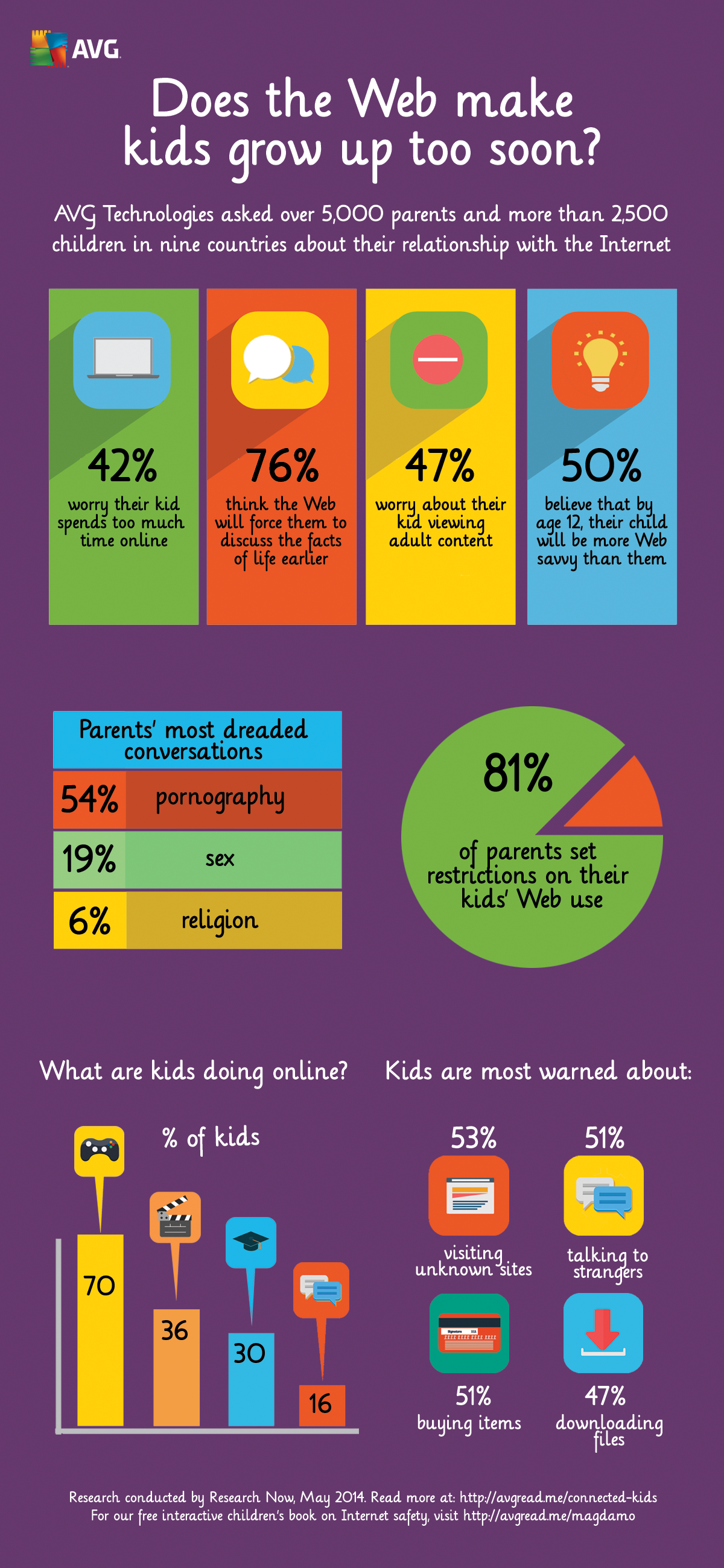We use cookies and similar technologies to recognize your repeat visits and preferences, to measure the effectiveness of campaigns, and improve our websites. For settings and more information about cookies, view our Cookie Policy. By clicking “I accept” on this banner or using our site, you consent to the use of cookies.
I Accept
This article contains:
AVG was interested to learn what this exposure to the web means for kids, what effect it has on their development and how their parents feel about this tech generation.
[embed]
https://www.youtube.com/watch?v=3YpvskYNl4o
[embed]
Concern for digital natives
The latest stage of our long running AVG Digital Diaries research series examines how the Internet is having an impact on how quickly kids grow up. Our findings showed that children are increasingly interacting with digital devices, as 42% of the parents polled by AVG said that they are concerned that their child spends too much time on devices, and a similar number (43%) said they were worried their child didn’t spend enough time outside.
The most common concern that parents shared over their child’s Internet activity was the potential access to inappropriate content (47%). It’s unsurprising therefore, that many parents have put in place some restrictions on connected device usage for their kids.
House rules
The overwhelming majority of parents (81%) said that they have placed some restrictions on their child’s Internet use, with the most common being “do not visit unknown sites” (53%), “do not talk to strangers” (51%) and “do not buy items” (51%).
Despite these good intentions, I suspect that parents do not necessarily follow these rules as strictly as they would like to. Only 40% of parents said they regularly check their kid’s Internet history; meaning that the majority of parents have little idea of what their kids are really getting up to online and to what content they are being exposed
To put that into perspective, our survey showed more parents check up on their partner’s online activity than on their kid’s!
What are kids really doing?
Given this context, what are kids really doing online, and most importantly, are they safe while doing it?
By far the most common activity, according to more than 2,500 kids that were polled by AVG in nine different countries, was “playing games on your own” (as opposed to multiplayer games with friends, 24%). The next most popular were watching “funny things” (46%) and “TV or movies” (36%).
The good news for parents is that all of these activities are at the safer end of the spectrum although watch out for those in-game purchases!
Do kids recognize the danger?
Although only 35% of the 5-10 year olds polled by AVG said that they understood the Internet could be a dangerous place, there is cause for optimism.
When asked what they were not allowed to do online, the majority of kids listed exactly the same house rules that their parents had laid out such as do not buy things or talk to strangers.
In fact, it’s reassuring to see that when AVG asked kids who in their household knew the most about the web, the most common answers were Mom and Dad.
Parents and the learning curve
It’s good to see that kids still believe their parents know best. However, when we asked parents a similar question, half of them said they expect their child will be more web savvy than them by the age of 12.
Clearly, parents feel that their child is on a steep learning curve when it comes to technology and feel under pressure to start the conversation about Internet safety. In fact, when we asked parents about which topic they are least comfortable talking to their child about and “pornography” was the runaway winner (54%), followed by sex (19%) and religion (6%).
Despite their reluctance to address some of the most prevalent topics, as many as 80% of parents do believe that the Internet will force them to discuss the facts of life with their child at an earlier age.
Magda and Mo
AVG’s research shows that 62% of parents expect to have these conversations by the age of 10, as many as five years earlier than they had them with their parents (50% said they had the conversation by 15 and 42% didn’t have it at all). To help parents have these difficult conversations that, thanks to the Internet, are happening increasingly earlier, AVG has developed a series of interactive children’s books called Magda and Mo to help parents learn along with their children about using the Internet safely.
The first adventure, ‘The Pirate’s Donut’, is designed for both kids and parents to use as a tool to start a discussion around using the Internet safely, something which needs to start at an age as 2, when children are already beginning to play games and watch nursery rhymes online. Take a look and try out the story for yourself, I’d love to hear your feedback.
You can follow me on Twitter @TonyatAVG and find my Google+ profile here.

